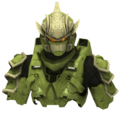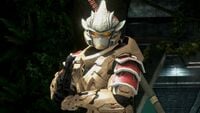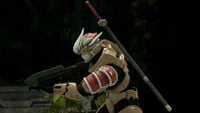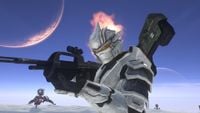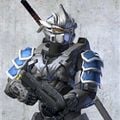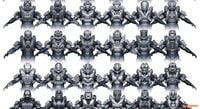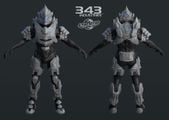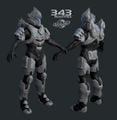Project HAYABUSA: Difference between revisions
From Halopedia, the Halo wiki
m (elimating redundancy) |
BaconShelf (talk | contribs) Tag: Undo |
||
| (574 intermediate revisions by more than 100 users not shown) | |||
| Line 1: | Line 1: | ||
{{ | {{Status|Canon}} | ||
{{Armor infobox | |||
|name=Hayabusa | |||
|image=[[File:HTMCC H3 Hayabusa Crop.png|250px]] | |||
|manufacturer=[[RKD]]{{Ref/Game|Id=h3|H3|Armor permutations (Halo 3)|Spartan Armor Customization|Detail=HAYABUSA Description}} | |||
|testsite= | |||
|type=MJOLNIR (GEN1) | |||
*[[MJOLNIR Powered Assault Armor/Mark VI|Mark VI]] | |||
|role=Heavy lifting and [[extra-vehicular activity]] | |||
}} | |||
[[ | '''Project HAYABUSA''' was a [[United Nations Space Command|UNSC]] powered armor program developed independently from, and as a rival to [[MJOLNIR Powered Assault Armor|Project MJOLNIR]]. The program later produced a MJOLNIR variant for the [[MJOLNIR Powered Assault Armor/Mark VI|Mark VI generation]].{{Ref/Book|Id=ENC|Enc11|Page=96}} | ||
==Overview== | |||
== | ===Design details=== | ||
The Hayabusa | The Hayabusa armor's advanced materials decreased its weight by nearly one-third,{{Ref/Reuse|h3}} and was aesthetically designed after ancient [[Japan]]ese samurai armor. It includes spiked shoulder pauldrons similar to traditional Japanese [[Wikipedia:Japanese armour#Construction|sode]] designs. | ||
The Hayabusa armor's helmet was designed with a defensive and ultraviolet-protective visor. Like all UNSC helmets, the visor is the weakest part. Thus, a small visor was designed to be more difficult to accurately penetrate. As such, the small visor provides for better protection of the wearer as well as better camouflage. The Hayabusa was designed with greater emphasis on heavy lifting and [[extra-vehicular activity]] than the MJOLNIR. It is slightly slower and less dexterous than its MJOLNIR counterpart, though it is nonetheless highly effective and possesses most of the design features of the MJOLNIR Mark VI.{{Ref/Book|Enc09|Page=93}} | |||
The helmet | |||
=== | ===Development history=== | ||
The Hayabusa is a powered battle armor system, similar to the [[MJOLNIR Powered Assault Armor|MJOLNIR armor]], except stemming from Project HAYABUSA as opposed to Project MJOLNIR. It was developed by the [[RKD]] group, an Earth-based think tank, in the year [[2536]], fifteen years before the [[MJOLNIR Powered Assault Armor/Mark V|MJOLNIR Mark V]] entered production. It was presented to the [[UNSC Ordnance Committee]] as an answer to the self-contained powered armor problem.{{Ref/Reuse|h3}} | |||
Originally, RKD developed Project HAYABUSA without knowledge of the classified [[Project MJOLNIR]]. After contacts were made between RKD and [[ONI]]'s [[Materials Group]], the two pooled their research resources, resulting in the creation of a MJOLNIR-compatible HAYABUSA variant. Featuring a number of stylistic and functional improvements, it became a crucial piece of hardware in the later years of the [[Human-Covenant War]].{{Ref/Reuse|ENC}} | |||
===[[ | ==In-game information== | ||
===''Halo 3''=== | |||
The Hayabusa [[Armor customization (Halo 3)|armor permutation]] is a special unlock in ''Halo 3''. | |||
{| class="wikitable" style="width: 75%;" | |||
! style="width: 15%"|Helmet | |||
! style="width: 55%"|Description | |||
! style="width: 15%"|Unlock requirements (''Halo 3'') | |||
! style="width: 15%"|Unlock requirements (''Halo: MCC'') | |||
|- align="center" | |||
|rowspan=4|[[File:HTMCC H3 Hayabusa Menu Render.png|100px]]<br/>Hayabusa | |||
|align="left"|'''Helmet:''' The critical innovation brought about by RKD's involvement in the development of power armor is in the use of advanced materials-reducing the weight of current generation armor by nearly a third. | |||
|Obtain all thirteen [[Halo 3 skulls|skulls]]. | |||
|rowspan=4|Unlocked by default. | |||
|- align="center" | |||
|align="left"|'''Shoulder:''' Although the two projects were developed wholly independent of one another, projects HAYABUSA and MJOLNIR mirrored each other in many ways. | |||
|Obtain nine skulls | |||
|- align="center" | |||
|align="left"|'''Chest:''' In late 2536, RKD -an Earth-based think tank- presented the UNSC Ordnance Committee with the answer to the self-contained powered armor problem: Project HAYABUSA. | |||
|Obtain five skulls | |||
|- align="center" | |||
|align="left"|'''MCC:''' While wholly independent of one another, projects HAYABUSA and MJOLNIR mirrored each other in many ways. | |||
|N/A | |||
|} | |||
== | ==Production notes== | ||
The Hayabusa armor was at some point [[Cut Halo 4 customization|intended for]] inclusion in ''[[Halo 4]]''{{'}}s [[multiplayer]]. Concept art was created for a [[MJOLNIR Powered Assault Armor (GEN2)|<nowiki>[GEN2]</nowiki>]] iteration of the armor by artist Gabo Garza.{{Ref/Site|Id=GaboGarzaArtstation|URL=https://www.artstation.com/artwork/XBk5Na|Site=ArtStation|Page=SPARTANS MP, Gabo Garza|D=27|M=4|Y=2021}} A high-poly model of this armour was later created by an artist at [[Liquid Development]], a studio which assisted in the creation of ''Halo 4''{{'}}s multiplayer armour sets. However, this version of Hayabusa has never been seen implemented within the game engine, and was not present in the final game. | |||
* | ==Trivia== | ||
{{Linkbox|gallery=yes|gallerypage=Images of HAYABUSA armor}} | |||
*The Hayabusa armor bears a resemblance to the armor worn by feudal-era [[Wikipedia:Samurai|samurai]]. The armor is named after [[ninjagaiden:Ryu Hayabusa|Ryu Hayabusa]], the protagonist of the ''[[Wikipedia:Ninja Gaiden (series)|Ninja Gaiden]]'' series and a combatant in the [[Wikipedia:Dead or Alive (series)|''Dead or Alive'' series]]. The helmet is almost an exact copy of the "ninja of the future" costume in ''[[Wikipedia:Ninja Gaiden (2004 video game)|Ninja Gaiden]]'' on the Xbox. Bungie likely created the Hayabusa armor as a tribute to Team Ninja for adding [[Nicole-458]] into [[Wikipedia:Dead or Alive 4|Dead or Alive 4]]. Team Ninja, the developers of the ''Ninja Gaiden'' series and ''Dead or Alive'' series, are mentioned in the credits for ''Halo 3''. | |||
*Hayabusa is Japanese for "peregrine falcon" and is also the [[Wikipedia:Hayabusa|name]] for an unmanned space mission conducted by the [[Wikipedia:Japanese Aerospace Exploration Agency|Japanese Aerospace Exploration Agency]] that returned to [[Earth]] on June 13, 2010, and the Nakajima Ki-43-III-KAI fighter craft flown during World War II. | |||
*[[SHINOBI-class Mjolnir]] is considered the spiritual successor of Project HAYABUSA. | |||
==Gallery== | ==Gallery== | ||
===''Halo 3''=== | |||
<gallery> | |||
File:HayabusaArmor.png|Close-up of the Hayabusa armor. | |||
File:HTMCC-H3 Hayabusa Closeup.jpg|A Spartan-II clad in full HAYABUSA armor. | |||
File:HTMCC-H3 Hayabusa with Katana.jpg|A view of the back of the HAYABUSA armor with the Katana. | |||
File:H3 Hayabusa with flame chest.jpg|A flaming Hayabusa helmet, triggered by the [[Bungie]] employee-only chest plate. | |||
File:H3 Hayabusa with katana.jpg|Hayabusa with [[katana]]. Available upon unlocking 49 of 79 [[achievement]]s. | |||
File:HTMCC H3 Katana Menu Render.png|Hayabusa with Katana as rendered in the menus for ''Halo: The Master Chief Collection''. | |||
</gallery> | |||
===''Halo 4''=== | |||
<gallery> | <gallery> | ||
File:H4 Concept MultiplayerArmors.jpg|Concept art for many ''Halo 4'' armors, including Hayabusa (third row, third column). | |||
File:H4 Hayabusa armor 3d model.jpg|Front and back renders of the Hayabusa armor in ''Halo 4''. | |||
File:H4 Hayabusa armor 3d model-2.jpg|Angled front and back renders. | |||
</gallery> | </gallery> | ||
== | ==List of appearances== | ||
* | *''[[Halo 3]]'' {{1st}} | ||
==Sources== | ==Sources== | ||
{{Ref/Sources}} | |||
{{ | {{Human exoskeletons}} | ||
[[Category: | {{Armor/Permutation|H3}} | ||
[[Category: | {{Navbox/Universe/Mjolnir|Overview|GEN1}} | ||
[[Category: | {{DEFAULTSORT:HAYABUSA}} | ||
[[Category:MJOLNIR armor]] | |||
[[Category:UNSC projects]] | |||
[[Category:Halo 3 multiplayer armor permutations]] | |||
Latest revision as of 19:46, August 16, 2024
| Hayabusa | |
|---|---|
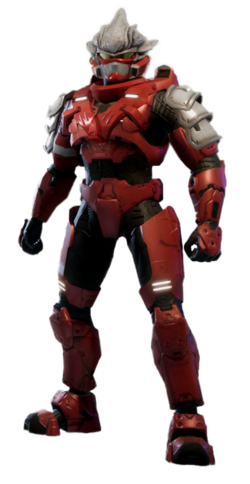
| |
| Production overview | |
|
Manufacturer(s): |
|
|
Type: |
MJOLNIR (GEN1) |
|
Role(s): |
Heavy lifting and extra-vehicular activity |
Project HAYABUSA was a UNSC powered armor program developed independently from, and as a rival to Project MJOLNIR. The program later produced a MJOLNIR variant for the Mark VI generation.[2]
Overview[edit]
Design details[edit]
The Hayabusa armor's advanced materials decreased its weight by nearly one-third,[1] and was aesthetically designed after ancient Japanese samurai armor. It includes spiked shoulder pauldrons similar to traditional Japanese sode designs.
The Hayabusa armor's helmet was designed with a defensive and ultraviolet-protective visor. Like all UNSC helmets, the visor is the weakest part. Thus, a small visor was designed to be more difficult to accurately penetrate. As such, the small visor provides for better protection of the wearer as well as better camouflage. The Hayabusa was designed with greater emphasis on heavy lifting and extra-vehicular activity than the MJOLNIR. It is slightly slower and less dexterous than its MJOLNIR counterpart, though it is nonetheless highly effective and possesses most of the design features of the MJOLNIR Mark VI.[3]
Development history[edit]
The Hayabusa is a powered battle armor system, similar to the MJOLNIR armor, except stemming from Project HAYABUSA as opposed to Project MJOLNIR. It was developed by the RKD group, an Earth-based think tank, in the year 2536, fifteen years before the MJOLNIR Mark V entered production. It was presented to the UNSC Ordnance Committee as an answer to the self-contained powered armor problem.[1]
Originally, RKD developed Project HAYABUSA without knowledge of the classified Project MJOLNIR. After contacts were made between RKD and ONI's Materials Group, the two pooled their research resources, resulting in the creation of a MJOLNIR-compatible HAYABUSA variant. Featuring a number of stylistic and functional improvements, it became a crucial piece of hardware in the later years of the Human-Covenant War.[2]
In-game information[edit]
Halo 3[edit]
The Hayabusa armor permutation is a special unlock in Halo 3.
| Helmet | Description | Unlock requirements (Halo 3) | Unlock requirements (Halo: MCC) |
|---|---|---|---|
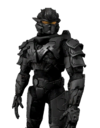 Hayabusa |
Helmet: The critical innovation brought about by RKD's involvement in the development of power armor is in the use of advanced materials-reducing the weight of current generation armor by nearly a third. | Obtain all thirteen skulls. | Unlocked by default. |
| Shoulder: Although the two projects were developed wholly independent of one another, projects HAYABUSA and MJOLNIR mirrored each other in many ways. | Obtain nine skulls | ||
| Chest: In late 2536, RKD -an Earth-based think tank- presented the UNSC Ordnance Committee with the answer to the self-contained powered armor problem: Project HAYABUSA. | Obtain five skulls | ||
| MCC: While wholly independent of one another, projects HAYABUSA and MJOLNIR mirrored each other in many ways. | N/A |
Production notes[edit]
The Hayabusa armor was at some point intended for inclusion in Halo 4's multiplayer. Concept art was created for a [GEN2] iteration of the armor by artist Gabo Garza.[4] A high-poly model of this armour was later created by an artist at Liquid Development, a studio which assisted in the creation of Halo 4's multiplayer armour sets. However, this version of Hayabusa has never been seen implemented within the game engine, and was not present in the final game.
Trivia[edit]

|
Browse more images in this article's gallery page. |
- The Hayabusa armor bears a resemblance to the armor worn by feudal-era samurai. The armor is named after Ryu Hayabusa, the protagonist of the Ninja Gaiden series and a combatant in the Dead or Alive series. The helmet is almost an exact copy of the "ninja of the future" costume in Ninja Gaiden on the Xbox. Bungie likely created the Hayabusa armor as a tribute to Team Ninja for adding Nicole-458 into Dead or Alive 4. Team Ninja, the developers of the Ninja Gaiden series and Dead or Alive series, are mentioned in the credits for Halo 3.
- Hayabusa is Japanese for "peregrine falcon" and is also the name for an unmanned space mission conducted by the Japanese Aerospace Exploration Agency that returned to Earth on June 13, 2010, and the Nakajima Ki-43-III-KAI fighter craft flown during World War II.
- SHINOBI-class Mjolnir is considered the spiritual successor of Project HAYABUSA.
Gallery[edit]
Halo 3[edit]
A flaming Hayabusa helmet, triggered by the Bungie employee-only chest plate.
Hayabusa with katana. Available upon unlocking 49 of 79 achievements.
Halo 4[edit]
List of appearances[edit]
- Halo 3 (First appearance)
Sources[edit]
- ^ a b c Halo 3, Spartan Armor Customization: HAYABUSA Description
- ^ a b Halo Encyclopedia (2011 edition), page 96
- ^ Halo Encyclopedia (2009 edition), page 93
- ^ ArtStation, SPARTANS MP, Gabo Garza (Retrieved on Apr 27, 2021) [archive]
| ||||||||||||||||||||||||||
| ||||||||||||||||||||||||||||||||||||||
